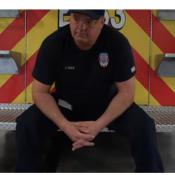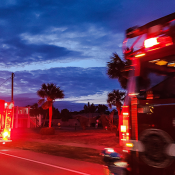
‘STOP BEING AFRAID TO BE JUDGED’ ABOUT YOUR REACTIONS TO ON-THE-JOB EXPERIENCES
True mental toughness means not burying emotions or avoiding difficult conversations
Published on Sep 3, 2020
By Jason Patton
One of the biggest subjects being discussed over the interwebs all across the world lately is mental health, especially as it applies to first responders. A lot of the discussion has been around why we sometimes suggest that people with mental trauma or post-traumatic stress disorder (PTSD) have a “weakness.” But how do you define weakness?
MENTAL TOUGHNESS
The previous approach to this “forbidden” subject was something out of a Salem witch-hunt novel: “If they have the mental health, they cannot be trusted and, therefore, must be exiled from the brotherhood!” (I hope you read that in a medieval Old English accent). But why? Society has taught us as small children, and especially as young first responders, that to NOT be mentally tough is to be flawed. And as funny as it is, I wholeheartedly agree with that statement – in part. Let me explain.
One aspect of mental toughness is measured by your ability to separate yourself from the not-so-lovely things that you come across in your job. This is drilled into our heads from the beginning of our careers because if we are emotionally invested in a call, we are more likely going to make decisions based on emotions rather than logic. This makes sense. But what about after the call, when the adrenaline subsides, and you are left to process the indescribable and sometimes very personally relatable things that you just witnessed? This is where I believe the real mental toughness begins, facing what happened – and talking about it.
SPEAKING UP WITHIN THE HERD
First responders subscribe to something called “herd mentality.” We all want to be a part of a group, a team, a brotherhood and sisterhood. Therefore, when someone in the group with the loudest voice or most seniority comes up with an idea, we want to follow along with everyone else to appease that thought process and be a part of the herd. But you would be amazed about how many people in the group do not actually agree with what that loud voice or senior member is talking about. And this is where YOU can demonstrate mental toughness.
Once, during shift change, one of the guys mentioned a student who had started crying on a cardiac arrest resulting from an overdose. The consensus quickly became that if she is crying now, then this “isn’t the job for her!”
To my surprise, one of the guys did not subscribe to that thought process and asked one simple question: “Does anyone know WHY she was crying?” Another crewmember told everyone that he had spoken with the student, and she was crying because one week prior, she had to do CPR on her best friend after suffering an overdose. The conversation quickly shifted to how we could find resources for her, how we had similar experiences in our pasts, and how we could better approach things like this in the future. The ENTIRE conversation turned because one person spoke up. One person thought outside the metaphorical box. One person changed the herd.
CHANGE THE CULTURE
Stop caring about what people will think about you if you talk about the things you have going on in your head. Stop being afraid to be judged. After all, the judging of other people is a very self-reflective act. Those who fear speaking up often fear being judged and painted as weak.
Show them that speaking up about the calls that bother you or the bad thoughts you have going through your head is the best demonstration of mental toughness that anyone could do.
It is up to YOU to change the culture. It is up to you to make being emotionally open cool again. It is up to you to make it OK to talk about the things that are causing us to go to more funerals and fewer retirements. But most importantly, it is up to us to laugh about the things that make us laugh, talk about the things that need to be talked about, and listen to the people who truly just need to be listened to.
ABOUT THE AUTHOR
Jason Patton has been a career firefighter and paramedic for Riviera Beach (Florida) Fire Rescue for 11 years. He created the Fire Department Chronicles, a popular series of YouTube and Instagram videos featuring the day in the life of a first responder. Patton found a way to connect with fellow first responders, firefighters, EMTs, and police men and women through comic relief and light-hearted, humorous sketches of life behind the scenes of these demanding jobs that come with high stress and traumatic situations. Patton serves as Banyan Treatment Center’s mental health and addiction advocate, helping first responders into their CREW (Crisis Response Employee Wellness) therapeutic programming.




